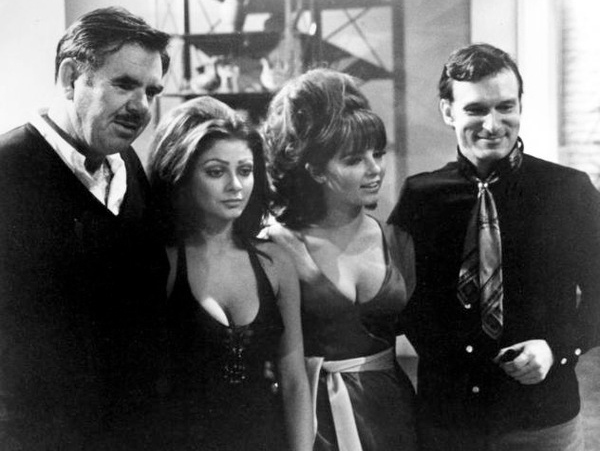At first the screen is filled by an enormous bunny tail. Then the camera pulls back to show the Chicago Playboy Club, and there’s Hugh Hefner, nodding to his friends and heading for the door.
He gets into his sports car, slips it into gear, and pulls out into traffic. He’s heading home, heading up there on State Street to the Playboy mansion. The car halts at a traffic light, and the camera zooms in the window at Hefner’s lean face. He sucks on his pipe, looking straight ahead.
On the sound track, a voice says, “My name is Hugh Hefner. Eight years ago I started Playboy magazine with $600 in borrowed capital. Today I’m head of an empire worth $20,000,000. I guess I’m the most successful man I know. I wouldn’t trade places with anybody in the world.”
Varooomm! The sports car lurches ahead, and on the screen the title flashes: “The Most.”
This is the 1962 documentary of Hefner and his Playboy empire, filmed by two Canadians, Richard Ballantine and Gordon Shepherd. It’s won a basketful of awards as a great documentary short, but it hasn’t been shown much in this country. It hasn’t been suppressed or anything; it’s just that theater managers would rather use coming attractions to pad out the space between features, instead of paying real cash for short subjects.
“The Most” got one of its rare screenings in the Chicago area last Monday night when Ravinia included it on its “New Cinema” program. The audience liked it, and no wonder.
The filmmakers obviously had Hefner’s full cooperation. They filmed a party at the Playboy mansion, shot Hef at work in his office, interviewed his business associates, his brother, his girlfriend, even his cleaning lady. A good part of the film is Hefner’s own narration.
After getting their footage, Ballantine and Shepherd went back to Canada, licked their lips and went to work. They apparently threw out most of the “straight” footage. But they kept the goofs, double meanings, flubbed lines, off-the-record footage and inadvertently revealing insights supplied by the cast of characters themselves.
The result: A film hilariously undercutting all those sometimes terribly cool Playboy types.
For example, Hefner has a lot to say about himself. “I come from a strong Puritan heritage,” he says. “My folks were from Nebraska… I was raised as a Methodist. But I’m a rebel at heart.”
“Hef is a genius,” an associate testifies. The camera cuts to Hefner, who grins: “Well, I guess you would have to say that, by definition, I am a genius…”
Then the camera cuts back to the associate: “But he’s not an intellectual, by any means. I guess he doesn’t read three books a year. But in his line of work you don’t have to be an intellectual.”
The associate’s speech began with him sitting quietly in a chair. But as he continues to talk, the camera shows him twisting furiously with Cynthia Maddox, a Hefner girlfriend and sometime Playmate of the Month.
Then we see Cynthia in front of the cameras. “I’m Hef’s girl,” she says. “He dates other girls, and I know it, and I don’t like it, and he knows I don’t like it, but there’s nothing I can do about it.” She sounds like the winner of the Miss Land O’ Corn competition being interviewed at a county fair. “But when I go out with other fellas, Hef doesn’t like it. Sometimes he’s pretty unintelligubble – uh, unintellibibble – uh, unintell…”
She simply cannot get the word out. She makes a face. She tries again: “Untelligabble… untellingibble…” Then she smiles and throws up her hands. “Oh, well,” she says. They’ll throw away that film and make another shot of her little speech, of course. Won’t they? No.
“I usually date girls somewhat younger than myself,” Hef says. “Say about 18 to 25 years old.” A shot shows him dancing with Cynthia. “I was married a long time ago. It was a mistake. I got married before I found myself. People should find themselves before they get married.”
He is leaning against a doorway, as the party in the background continues. “This is what I guess you’d call just a typical party here at the house,” he says. Shots of girls swimming in the pool beneath the living room. “Most of our parties start about one o’clock in the morning and last until five or so. I’m a night person. I’ve always been able to function, uh, better in the early morning hours…”
His face takes on a thoughtful look, as if he’s wondering how that will sound. Oh well, they can always cut it out, can’t they? Sure they can. He starts again: “Because I’m a night person, most of my friends are night persons – uh, people, as well, because they’re up at night too, and…”
He grinds to a halt.
“My name is Benny Dunn,” says a middle-aged man sitting in an armchair. He takes a sip of his drink, spits an ice cube into his hand, drops the cube back into the drink, smiles, and starts, again. “My name is Benny Dunn. I’m in charge of public relations for Playboy. I can’t begin to tell you, I can’t even start to express myself on what Hef has done for my frame of mind.” As Dunn continues talking, the camera cuts to a shot of him asleep in a chair later during the party.
“I’m Hugh Hefner’s brother Keith,” says a young man who looks like Hefner. “I’m his brother because…” You can look at his face and see that he’s trying to think how to end a silly sentence like that. “Because we both have the same mother,” he finally says, brightly.
“When Hugh was a kid he wanted to be a veterinarian,” Hefner’s brother continues. “He always liked dogs and cats.” He thinks for a moment. “And birds,” he adds.
Then there is a shot of dozens of Playboy secretaries at work. Cut to a shot of the same office, late at night, empty except for the cleaning lady and Hefner. Hefner goes into his private office and shuts the door. He is dressed in pajamas and a dressing gown.
“I work a lot late at night, when everybody else has gone home,” he explains. “Often, I’ll be here until the sun comes up. Sometimes I even work here at the desk in my PJs.”
He opens up a scrapbook. “I live at such a busy pace that I sometimes forget how far I’ve come,” he says. “Sometimes late at night, here in the old office, I’ll light up my pipe and just let time come to a stop for a moment, as I think back over what’s happened to me.” Franklyn MacCormack couldn’t have said it better.
In the outer office, the cleaning lady dusts off a desk and then says a few words for the camera. “Everyone is inspired by Mr. Hefner,” she says. “He’s so full of energy and drive that he even makes me inspired to try just a little harder.” She smiles sentimentally and says, “I guess you could say he’s the son I never had…”
Back at the mansion, the party is still in full swing. There’s a shot of Hefner and Cynthia dancing again, and then suddenly the action stops and the camera freezes a picture of the two, caught in an instant of the Twist. There is silence for a full 10 seconds. Then, once again, Hefner’s voice: “I guess you could say, I’m just a typical Methodist kid at heart.”












